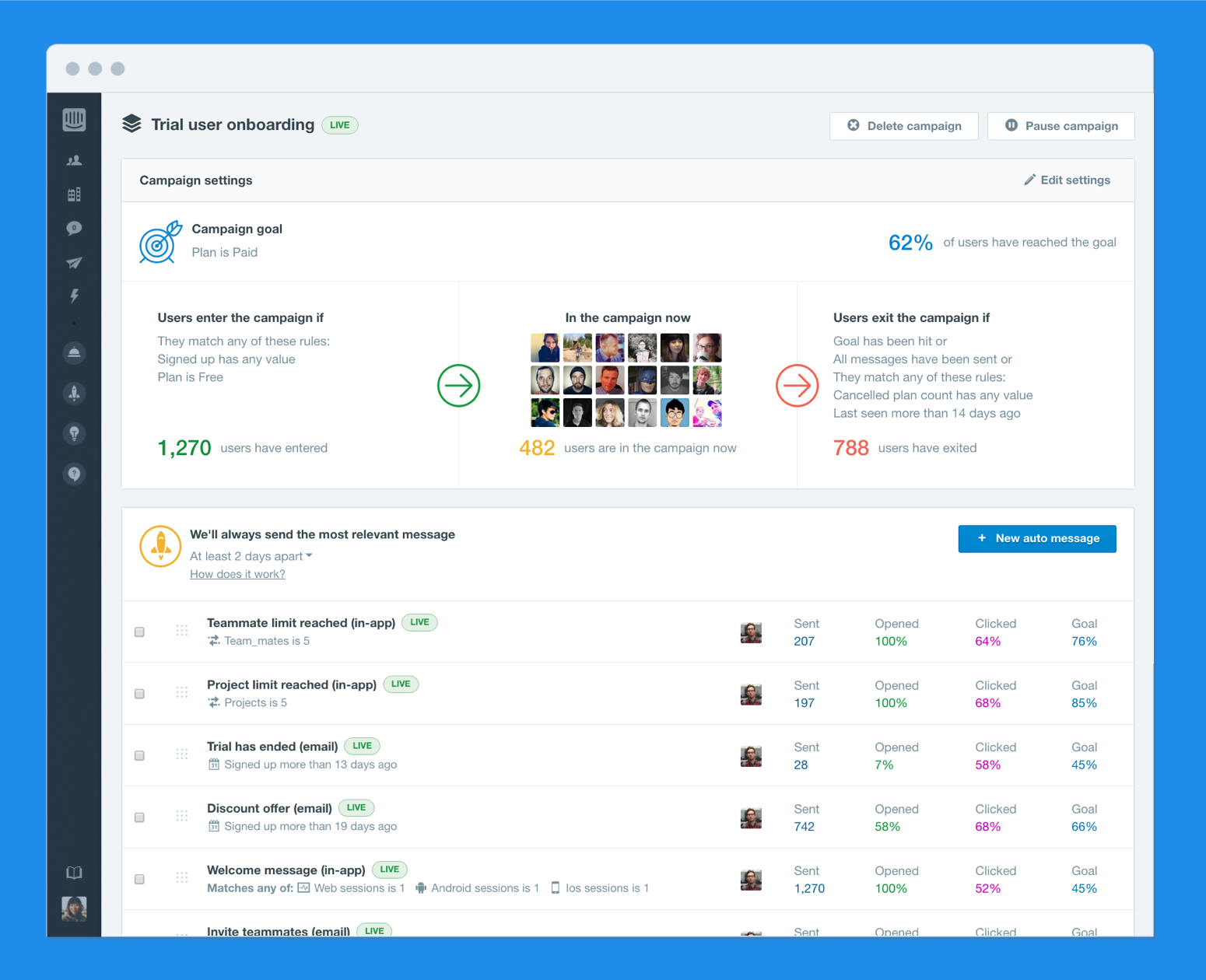Let’s face it. When it comes to creating email drip campaigns and mapping out the customer journey, what starts as a simple flowchart can quickly turn into something more akin to Russell Crowe’s formula-emblazoned windows in “A Beautiful Mind.”
Today, Intercom launches Smart Campaigns, a marketing automation platform that takes a totally different approach to the problem.
How does it work, and why is it different? I went to Intercom’s offices in San Francisco to see, first-hand, how Smart Campaigns work. The promise being offered by the solution is simple.
“Give us a list of messages, and we’ll work out what is important to send and when,” Des Traynor, cofounder at Intercom, told me.
And while Smart Campaigns contains levels of complexity, they are hidden beneath a simple interface that delivers on that promise.
A user will start by setting rules for personalized campaigns, based on creating customer segments. For example, you might start a campaign for every brand-new web user, or those who have engaged with you via a particular channel. Exit conditions are also set, such as when all the messages have been sent, or when the customer completes a particular action.
Now, you simply add messages. Smart Campaigns will always attempt to send the most relevant message at the right time, and with a suitable delay between messages so as to avoid saturation and cause a negative response. Delivery is measured so that you know how many messages have been delivered, what percentage were opened, how many people clicked, and how many reached the goal you’ve set.
Smart Campaigns sends its messages across a range of channels, including mobile push notifications, in-app messages, or via email. By choosing the right channel at the right time, messages increase in relevance, and, by customizing the delivery cadence and which messages should be sent on a per-customer basis, campaigns feel highly personalized.
This approach also solves another issue with traditional marketing automation and drip campaigns — the pain you go through when you want to make a small change to the flow.
“With traditional systems, the second you have one new product or one new message, you have to reconsider the entire flow,” Traynor said. “With this mechanism, you just add the message. Everything else is handled for you.”
Smart Campaigns are bundled with Intercom’s Engage solution.
“Intercom’s product model is based on buying products that allow you to complete certain jobs,” Colin Bentley, group product manager at Intercom, told me. “When you purchase the Engage product, for example, you get everything you need to fulfill the ‘job’ of onboarding new users, announcing new features, and re-engaging people that slip away.”
Smart Campaigns is Intercom’s latest solution to help its customers engage an increasingly mobile audience. What is next for mobile engagement, according to Bentley?
“In the future, messages sent by businesses will reach customers on any one of their many devices, rather than waiting for customers to show up in a predetermined place,” Bentley said. “We will also see a wider and wider set of channels being used for marketing and support, including chat interfaces within an application, email, push notifications, messengers, and social media networks like Twitter.”
And the current interest and explosion in messaging platforms as the new ‘next big thing’ hasn’t passed Intercom by, either.
“We will also see mobile engagement interactions following the trends set by the explosion of the messenger experience,” Bentley said. “Messaging is becoming the predominant way we interact with friends, family, and colleagues, and this will extend into a person’s interaction with businesses. Beyond Intercom, we’re seeing this take off with the rise of bots, as well as with brand integrations in messengers like Facebook, WhatsApp, and others.”
Of course, smartphones are seen by their owners as truly personal devices, so how do we engage users without making them feel that we’re encroaching on their privacy?
“The majority of mobile engagement messages that businesses send today are impersonal, poorly targeted, and a one-size-fits-all experience,” Bentley said. “This leads to negative sentiment and a likelihood for the customer to ignore or block the communication. In our experience, we’ve seen somewhat of a counter-intuitive finding that the more targeted, personal, and relevant your message, the better received it is. This comes up time and time again in our testing. When you send a relevant and timely engagement message, customers love it.”
Smart Campaigns is available today and is bundled with Intercom’s Engage product, which starts at $79/month.
VentureBeat's mission is to be a digital town square for technical decision-makers to gain knowledge about transformative enterprise technology and transact. Learn More

